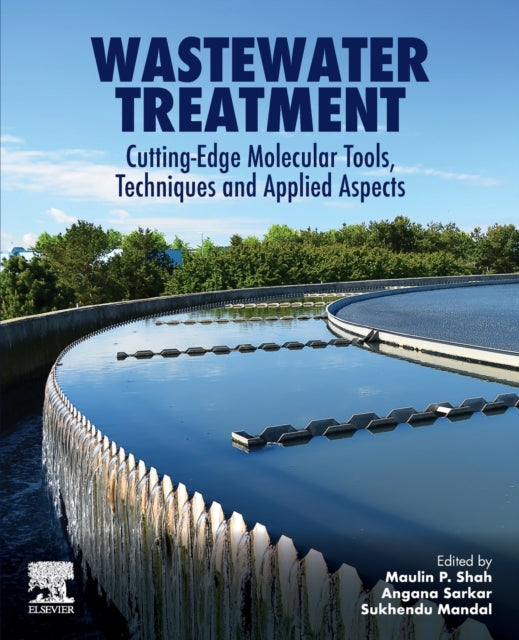Shulph Ink
Wastewater Treatment: Cutting-Edge Molecular Tools, Techniques and Applied Aspects
Wastewater Treatment: Cutting-Edge Molecular Tools, Techniques and Applied Aspects
YOU SAVE £7.31
- Condition: Brand new
- UK Delivery times: Usually arrives within 2 - 3 working days
- UK Shipping: Fee starts at £2.39. Subject to product weight & dimension
Bulk ordering. Want 15 or more copies? Get a personalised quote and bigger discounts. Learn more about bulk orders.
Couldn't load pickup availability
- More about Wastewater Treatment: Cutting-Edge Molecular Tools, Techniques and Applied Aspects
Wastewater Treatment: Cutting-Edge Molecular Tools, Techniques, and Applied Aspects reports new findings in molecular biology strategies, introduces new trends, and advances in environmental bioremediation.
Format: Paperback / softback
Length: 596 pages
Publication date: 04 February 2021
Publisher: Elsevier Science Publishing Co Inc
Wastewater Treatment: Cutting-Edge Molecular Tools, Techniques, and Applied Aspects delves into groundbreaking discoveries in established molecular biology approaches, encompassing their limitations, complexities, and potential applications in removing environmental pollutants through advancements in cutting-edge tools. Furthermore, this comprehensive resource introduces readers to emerging trends and advancements in environmental bioremediation, offering in-depth discussions on recent developments in this field.
The utilization of cutting-edge molecular tools, techniques, and applied aspects in wastewater treatment has emerged as a promising approach to address the challenges posed by industrial and municipal waste. By leveraging the power of molecular biology, researchers and practitioners are able to develop innovative solutions that effectively remove pollutants from wastewater, ensuring the safety of human health and the environment.
One of the key challenges in wastewater treatment is the presence of complex and diverse pollutants. Traditional treatment methods often rely on physical and chemical processes, which may be inefficient and ineffective in removing certain contaminants. Molecular biology, on the other hand, offers a range of tools and techniques that can target specific pollutants and degrade them efficiently.
One of the most promising molecular tools in wastewater treatment is genetic engineering. Genes can be engineered to produce enzymes or other proteins that are capable of degrading specific pollutants. For example, bacteria can be engineered to produce enzymes that can break down organic compounds such as polychlorinated biphenyls (PCBs) or petroleum hydrocarbons. These engineered bacteria can then be used in bioremediation processes to remove these pollutants from wastewater.
Another important molecular tool in wastewater treatment is molecular diagnostics. Molecular diagnostics can be used to identify and quantify the presence of specific pollutants in wastewater. This information is crucial for developing effective treatment strategies and monitoring the effectiveness of treatment processes. Molecular diagnostics can also be used to monitor the growth and behavior of bacteria in wastewater treatment systems, which can help optimize treatment processes and prevent the formation of harmful biofilms.
In addition to molecular tools and techniques, wastewater treatment also involves the application of advanced applied aspects. One of these aspects is the use of nanotechnology, which involves the manipulation of materials at the nanoscale level. Nanotechnology can be used to develop new materials that are more effective in removing pollutants from wastewater. For example, nanomaterials such as carbon nanotubes or graphene oxide can be used to enhance the absorption of pollutants or to promote the growth of bacteria that are capable of degrading pollutants.
Another applied aspect of wastewater treatment is the use of membrane technology. Membrane technology can be used to separate pollutants from wastewater, allowing for the recovery of valuable resources such as water and nutrients. Membrane technology can also be used to treat wastewater that contains high levels of toxic or hazardous pollutants, ensuring that the treated wastewater is safe for discharge into the environment.
Despite the many benefits of molecular tools, techniques, and applied aspects in wastewater treatment, there are also challenges that need to be addressed. One of these challenges is the cost of implementing these technologies. Molecular biology and nanotechnology are often expensive technologies, and their implementation may require significant investment from governments, industries, and other stakeholders.
Another challenge is the scalability of these technologies. While molecular biology and nanotechnology can be used to treat small-scale wastewater treatment systems, their implementation in large-scale systems can be challenging due to the need for specialized equipment and expertise.
In conclusion, wastewater treatment: cutting-edge molecular tools, techniques, and applied aspects has emerged as a promising approach to address the challenges posed by industrial and municipal waste. By leveraging the power of molecular biology, researchers and practitioners are able to develop innovative solutions that effectively remove pollutants from wastewater, ensuring the safety of human health and the environment. While there are challenges that need to be addressed, the continued development and implementation of these technologies will play a crucial role in achieving a sustainable and environmentally friendly future.
Weight: 1198g
Dimension: 235 x 192 x 31 (mm)
ISBN-13: 9780128218815
This item can be found in:
UK and International shipping information
UK and International shipping information
UK Delivery and returns information:
- Delivery within 2 - 3 days when ordering in the UK.
- Shipping fee for UK customers from £2.39. Fully tracked shipping service available.
- Returns policy: Return within 30 days of receipt for full refund.
International deliveries:
Shulph Ink now ships to Australia, Belgium, Canada, France, Germany, Ireland, Italy, India, Luxembourg Saudi Arabia, Singapore, Spain, Netherlands, New Zealand, United Arab Emirates, United States of America.
- Delivery times: within 5 - 10 days for international orders.
- Shipping fee: charges vary for overseas orders. Only tracked services are available for most international orders. Some countries have untracked shipping options.
- Customs charges: If ordering to addresses outside the United Kingdom, you may or may not incur additional customs and duties fees during local delivery.


